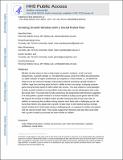| dc.contributor.author | Park, Hae Won | |
| dc.contributor.author | Rosenberg-Kima, Rinat | |
| dc.contributor.author | Rosenberg, Maor | |
| dc.contributor.author | Gordon, Goren | |
| dc.contributor.author | Breazeal, Cynthia Lynn | |
| dc.date.accessioned | 2020-06-02T12:59:12Z | |
| dc.date.available | 2020-06-02T12:59:12Z | |
| dc.date.issued | 2017-03 | |
| dc.identifier.isbn | 9781450343367 | |
| dc.identifier.uri | https://hdl.handle.net/1721.1/125604 | |
| dc.description.abstract | Mindset has been shown to have a large impact on people's academic, social, and work achievements. A growth mindset, i.e., the belief that success comes from effort and perseverance, is a better indicator of higher achievements as compared to a fixed mindset, i.e., the belief that things are set and cannot be changed. Interventions aimed at promoting a growth mindset in children range from teaching about the brain's ability to learn and change, to playing computer games that grant brain points for effort rather than success. This work explores a novel paradigm to foster a growth mindset in young children where they play a puzzle solving game with a peer-like social robot. The social robot is fully autonomous and programmed with behaviors suggestive of it having either a growth mindset or a neutral mindset as it plays puzzle games with the child. We measure the mindset of children before and after interacting with the peer-like robot, in addition to measuring their problem solving behavior when faced with a challenging puzzle. We found that children who played with a growth-mindset robot 1) self-reported having a stronger growth mindset and 2) tried harder during a challenging task, as compared to children who played with the neutral-mindset robot. These results suggest that interacting with peer-like social robot with a growth mindset can promote the same mindset in children. Keywords: early childhood education; mindset; perseverance; grit; child-robot interaction; cognitive architecture; social robots | en_US |
| dc.description.sponsorship | National Institute of Health (Grant 5R01HD086899–02) | en_US |
| dc.language.iso | en | |
| dc.publisher | Association for Computing Machinery (ACM) | en_US |
| dc.relation.isversionof | https://dx.doi.org/10.1145/2909824.3020213 | en_US |
| dc.rights | Creative Commons Attribution-Noncommercial-Share Alike | en_US |
| dc.rights.uri | http://creativecommons.org/licenses/by-nc-sa/4.0/ | en_US |
| dc.source | PMC | en_US |
| dc.title | Growing Growth Mindset with a Social Robot Peer | en_US |
| dc.type | Article | en_US |
| dc.identifier.citation | Park, Hae Won et al. "Growing Growth Mindset with a Social Robot Peer." Proceedings of the 2017 ACM/IEEE International Conference on Human-Robot Interaction (HRI) March 2017, Vienna, Austria, Association for Computing Machinery (ACM), March 2017 | en_US |
| dc.contributor.department | Massachusetts Institute of Technology. Personal Robots Group | en_US |
| dc.contributor.department | Massachusetts Institute of Technology. Media Laboratory | en_US |
| dc.relation.journal | Proceedings of the 2017 ACM/IEEE International Conference on Human-Robot Interaction | en_US |
| dc.eprint.version | Author's final manuscript | en_US |
| dc.type.uri | http://purl.org/eprint/type/ConferencePaper | en_US |
| eprint.status | http://purl.org/eprint/status/NonPeerReviewed | en_US |
| dc.date.updated | 2019-07-22T12:31:45Z | |
| dspace.date.submission | 2019-07-22T12:31:47Z | |
| mit.metadata.status | Complete | |
